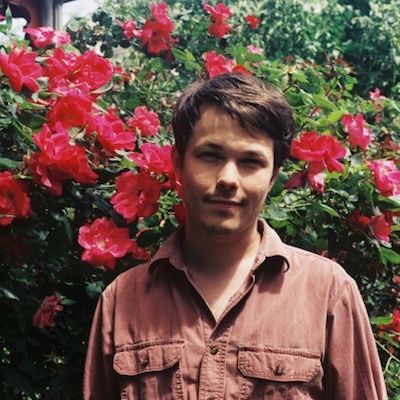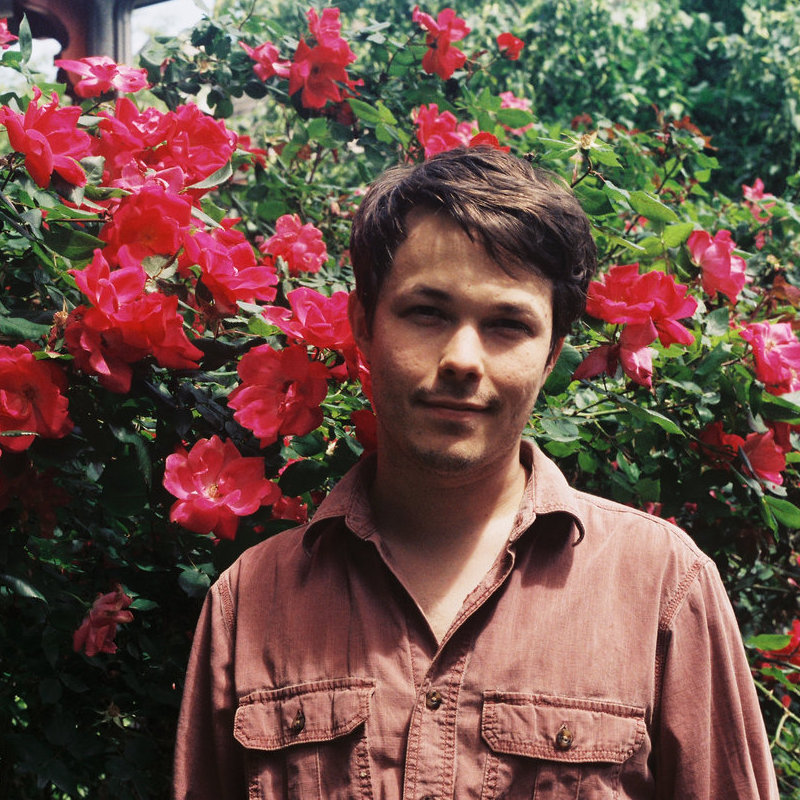
by Mia Hughes
The Philly based musician and Dear Life founder on art, life and how music can cross the channels between us
Michael Cormier was having trouble sleeping. It was the early days of the pandemic, and his body wasn’t used to the lack of physical stimulation owed to being cooped up all day. Often, he would be gripped with anxiety; he’d feel a sudden pain in his body and wonder if he was going to die. But in the light of the next morning, everything was different. The world began anew, and so could he. This was the state of mind that inspired Degradation – the opening track on the 29-year-old folk artist’s newest solo record, More Light!!, on which he sings the completely indelible line, ‘Waking up becomes an act of pure creation.’
‘I love thinking about living and perceiving as an artistic act,’ says Cormier. ‘You can choose to colour what you’re seeing in so many different ways. No matter what is happening, I can still choose to see things slightly differently from the way I was seeing them before. That is totally enough to keep me going.’

Cormier grew up in Fairhaven, Massachusetts, then, as a middle schooler, moved to Maine. His dad was a multi-instrumentalist and songwriter; his mother a flautist. He grew up immersed in classic rock and jazz with instruments constantly at hand to explore. He explains, ‘I feel like I learned music kinda like how we learn our first languages.’
As a high schooler, he made friends with fellow musicians, Dan Wriggins and Pete Gill, the former of which was a Bob Dylan devotee who introduced Cormier to the power of folk music. After college, in 2015, the trio moved to Philadelphia together where they honed the contemplative alt-country of their new band Friendship in the DIY basement scene; Wriggins fronted, while Gill was on guitar and pedal steel, and Cormier on drums.
Once in Philly, Cormier also formed the experimental instrumental band Hour, for which he was the guitarist and songwriting engine. ‘That music was really touching on some sort of spiritual lack I was feeling,’ he says. ‘It was almost like a form of church or something. It allowed me to get to a place that I don’t think I can talk about with words.’ Still, though a comfortable and accomplished instrumentalist, Cormier felt an itch to allow his personality to come to the fore as a solo artist – resulting in his first solo full-length in 2017. ‘I feel like I use songwriting as a communicative tool; a way of expressing realities that I know, and so I guess I feel like I don’t have much of an option.’
In 2019, with the release of two more solo albums, Cormier created Dear Life Records, an independent operation that he envisioned as an umbrella for his various scattered projects. It began to grow when he reached out to the Athens, Georgia-based instrumental artist, Shane Parish – the first signing outside of his immediate circle. ‘I was really inspired, I guess just by the curatorial potential, and then how smart curation can also just lead to an exciting community that feels good to be a part of,’ says Cormier. These days, it’s a tight-knit but varied roster, consisting of anything from folk to jazz to electronic, yet possessing a strong sense of community and mutual inspiration. ‘I don’t feel drawn to any specific genre. I care a lot more about innovation. It’s a vision that’s being actively defined and re-defined, but there is this fluidity that I think we’re looking for; music that is co-existing in multiple spaces.’
More Light!! took shape throughout 2019 and 2020 – beginning with an extensive instrumental demoing process from which Cormier would ‘karaoke style’ develop melodies. ‘It feels really impressionistic, and, because of that, there’s a lot of improvisation embedded in that process,’ he explains. Though home-recorded, he utilised the help of friends from afar, soliciting remote contributions of harmonies, violin, pedal steel and other brushes of detail. ‘With this record, I kinda learned when to stop adding things and to be like, “Hey, you, person I really love and respect. Why don’t you add something to this?” That’s really what elevated the record a lot.’ The title is cribbed from the supposed last words of the poet, Goethe, and nods to the abundance of light sources referenced across the album. Cormier added the exclamation points as a mark of sincerity, and a joke about his texting habits. ‘Now there’s so much doubt in everything, that you do the double exclamation point to be like, “No, no, really. These words are true.”’
Cormier’s lyrics tend to focus on the mundane – the everyday; a subtly depressing birthday party at a bar in Last Hurrah, his dog focusing intently on a squirrel in Buggin, a summer of swimming pools and barbecues in Yellow Sadness. Its brilliance is in how he extracts the meaning that we assign these seemingly inconsequential details without even realising it. His careful observation, both external and internal, makes the record feel deeply alive and resonant. ‘Mundane’s a funny word ‘cause it can have a negative connotation of stagnation or boringness,’ he says. ‘But I’m writing about just objects and situations and people that I engage with every day. And that doesn’t feel stagnant; it feels teeming. We’re constantly building and tearing down worlds just based on what we’re noticing, and what captures our attention at any moment.’
‘Every day you’re gonna see so many paradoxes all the time. You’ll see something exceptionally beautiful and you’ll see something exceptionally ugly in, like, the span of five minutes. I don’t necessarily try to understand it, but I try to appreciate the vast range of lives and experiences that are happening all the time.’
In the grip of his late 20s, one of the biggest driving forces on his observations throughout the album was a fear of change. ‘Balancing a fear of ageing with an increased appreciation for the fact that everything does decay,’ he says, ‘I was thinking a lot about transitions and endings, and the fear that I do viscerally feel when I think about that stuff, but also trying to reclaim a sense that it’s okay.’ As such, there’s a definite sense of anxiety across the album – that just as much as he observes the small details, he frets about them too. Yet there are also attempts to quell and soothe that anxiety; to adjust his perspective or make peace with things that trouble him. The track Control sees him long for the ability to go with the flow, acknowledging, ‘It sure takes a psychic toll to cling and not let go.’ ‘’The song is an idealised life that I’m not actually living,’ he admits. ‘It’s sorta dreamlike; it’s definitely a fantasy. But I think I have access to some moments like that. I think even if you can be comfortable giving up little slivers of control, in even just the most mundane situation, it can feel good.’
‘I feel like often with the record, it’s like wishful thinking,’ he adds. ‘It’s definitely something that you want to believe is true, and then, over time, maybe long after the record’s done, maybe then you feel like it did come to fruition. I think with this record, I have kind of risen to the challenge it presents, of trying to accept what can’t be controlled a little more than I have historically been able to do.’
Cormier’s viewpoint on More Light!! is resolutely internal, though not hermetic. That is to say, the presence of human interaction, of love and friendship and hurt, is strongly felt across the album; he’s missing someone on When You Pass Through, ignoring someone on Call Declined, offering support on I’ll Stay on the Line. But we aren’t privy, really, to these relationships, to their nature, or that of the other person involved; only to the reflections they create inside Cormier. It sits in the underlying loneliness of humanity, the knowledge that there is a gap between our own self and any other person that can’t truly be closed. ‘A lot of artwork that has moved me the most has been rooted in that conflict, of wanting to be known, wanting to be seen, wanting to be understood, and never having that fully happen,’ Cormier says. One such source of inspiration was the author, Virginia Woolf, whom he mentions by name – albeit a bizarre dream version of her, who’s captaining a motor boat – in the closing track Empty Mugs. He explains, ‘She really explored the depths of how rich and also how lonely her interior life was. That really excited me, and I was wanting to imagine, “what if she was a 21st century DIY musician? Could she have created a similar emotional response in her audience in a different medium?”’
Of course, here in the 21st century, the idea of true connection is only complicated further by the ubiquity of technology. The songs on More Light!! are often set to the glow of a smartphone, and that phone’s opposing potentials – to either bring us closer or distract us from each other – are held in equal regard. Buggin, particularly, raises that question; Cormier is idly texting all of his contacts just to see who writes back, while in front of him his dog focuses its whole self on only what’s in front of it. ‘I want lots of things pretty badly / Though none quite like that,’ Cormier observes. ‘I know the feeling of just wanting to feel seen, even in this way that has nothing to do with physically being seen,’ says Cormier. ‘It’s just a brand new phenomenon that no generation without these devices has ever had to really think about. Now it just feels like everyone exists all the time. I think that’s powerful, but it can be hard to disengage from that too.’
He adds, ‘I got AOL Instant Messenger when I was in early middle school or something, so there’s been a sizeable chunk of my life using this sort of stuff. I feel like is this gonna be it? Sometimes I wake up and I’m checking social media and I don’t really even care about half of the stuff I’m reading. But it’s so ingrained in my habit that I just keep doing it. It’s like, am I just gonna keep doing this? It gets exhausting to me to think that way.’ The album’s liner notes describe the feeling as a ‘quarter-life malaise’, and it’s something that Cormier’s intent observation across More Light!! serves to combat; in the information age, perhaps to pay attention to the quiet things, the things that elude simple definition and the things that lie just beyond our grasp, is a life-affirming choice. Life as an act of art.
Plus, Cormier ponders, in music there lies a form of connection that we can’t otherwise access; a way of closing the gap between us, and of extending the limitations of our regular selves. Art as an act of life. ‘I feel like, lyrically, I’m accepting that I’m never going to be fully known, and I’m never gonna fully know others, but musically, I can touch upon this thing that’s like, yes, music can cross channels between people,’ he says. ‘The music genuinely believes and I think summons up this feeling of transcendent connection.’
So, hidden between each unassuming vignette of More Light!! is an entire universe of selfhood; more than we would ever know was contained in any one person, even in ourselves, had it not been ushered into the light by the act of creation. It allows one to understand their own self through the rare act of understanding another. It’s beautiful how gently the album shows us all of this; it doesn’t give or take, but just shows. It’s a remarkable tribute to the power of paying attention.
If you’d like to support us by subscribing to our zine, click here – it’s just £6 a year for four copies (inc p&p).





